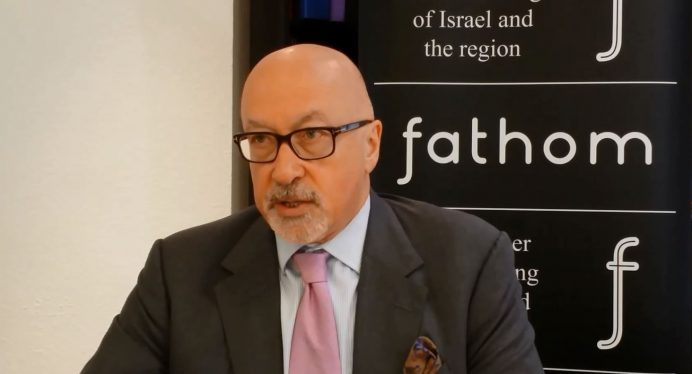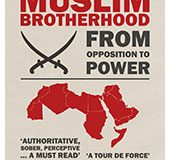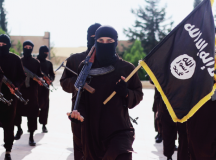Sir John Jenkins is a former UK Ambassador to Syria (2007-9), Libya (2011) and Saudi Arabia (2012-5). In 2014 he wrote a major policy review into the Muslim Brotherhood and Political Islamism for Prime Minister David Cameron. He is Executive Director of The International Institute for Strategic Studies (IISS) and a Senior Fellow at the Jackson Institute for Global Affairs at Yale. He spoke to a Fathom Forum in London on 3 November 2017.
The Challenge of Islamism
The impetus for the 2014 Muslim Brotherhood Review went back to David Cameron’s Munich speech in 2009. For him and other members of the Tory party there was a long-standing concern that we were not dealing with a particular set of challenges arising from Islamism – we should say ‘Islamisms’ as there are different versions – in a coherent way. I visited 13 countries in six months. Charles Farr and I must have interviewed over 200 people, including government officials, Salafists and other Islamists.
The key to confronting the Islamist challenge is to understand what the challenge is.
There is a lot of nonsense talk about the Brotherhood’s approach to violence, including by many of its own members who say that the group has always been a peaceful organisation, which simply isn’t true. There is a tendency to see violence within the Brotherhood just as we tend to see anti-Semitism, homophobia, and misogyny, as an epiphenomenon. In fact, violence has been constitutive of the Brotherhood ideology since its origins. It wasn’t invented by the Brotherhood, of course, but has been present in much political discourse in the Middle East since the early 20th century.
The fundamental challenge posed by Islamism is ideological. Islamism is a set of ideas, an epistemic framing system designed to change the world. From the beginning, violence was for the Brotherhood always a tactical question – it was very Gramscian in the sense that Antonio Gramsci famously distinguished between, but sought to combine a ‘war of position’ and ‘war of manoeuvre’, a longer term occupancy of the strong points of civil society and a frontal assault on the state. The Brotherhood’s ultimate objective is to take power and create what they construe as a true Islamic state. For them, as in much orthodox Islamic jurisprudence, the state is a vehicle for salvation – an idea they share with all radicalised Islamists including ISIS and other actively violent Islamist movements. However, in the 1960s, with its leaders languishing in Nasser’s jails, the Brotherhood decided that the road to success was lay through a war of position, a gradual achievement of a normative hegemony within a society, rather than a frontal assault to conquer state power through violence. But those two trends – violence and non-violence – have always been present. Even now, there is a dialectic between them, as demonstrated in Egypt in 2013 when the Brotherhood split into three parts. One part is the traditional leadership which by and large is in jail, whilst others are outside and some of them are associated with a number of disparate movements, like Liwa al-Thawra and al-Hasm, which are prepared to use violence to confront and overturn the state like the Muslim Brotherhood tried in the 1940s and 1950s.
The relationship between the Brotherhood and more theatrically violent groups like ISIS or al-Qaeda is complex. They criticise each other. If you read Dabiq, ISIS’s official magazine, you will find articles accusing the Brotherhood of being feeble imitations of the real thing not prepared to put their blood on the line. The Brotherhood have criticised ISIS and al-Qaeda for being unproductively violent. But this is what Freud called the narcissism of small differences: the end-state of all these groups is the same.
Central to their shared ideology are the ideas of Sayyid Qutb, a seminal figure for all Islamist movements. Qutb’s Ma’alim fi al-Tariq, or Milestones, is the foundational text of Islamism, particularly violent Islamism. There is a fantastic interview that you can find on Youtube of Ahmad Mansour, the famous Al Jazeera interviewer and Abu Mohammad al-Jolani, the al-Qaeda-linked Jabhat al-Nusra leader in Syria. He says to al-Jolani, ‘Everything you’re doing and saying is straight out of the Muslim Brotherhood and Qutb’s handbook. There are some minor differences but by and large they’re the same.’ And al-Jolani replies, ‘Yes; you’re right that Qutb is essential and we teach him in our schools.’ The interview then cuts to Mansour in one of the schools listening to the teachings of Qutb’s doctrine of Jahiliyya (ignorance) and hakimiyya (sovereignty). And you can find successive murshids (teacher) and deputy murshids on film praising Qutb in extravagant terms. You have to understand this in order to understand the constitutive ideological challenge of Islamism.
There is also a tendency in Western circles to see Islamism, particular its Muslim Brotherhood offshoot, as the authentic expression of an Arab ‘general will’. This too is a mistake. If you look at support for the Brotherhood as expressed through elections it’s interesting what you see. In Egypt in 2012, the Brotherhood’s Freedom and Justice Party (FJP) received about 11 million votes out of a possible 52 million. So even at the height of its power it was only gaining about 20 per cent of the vote, not a majority or even a plurality. In the period from 2011 through to 2013 until President Abdel Fattah al-Sisi came to power, we see significant support for the FJP from the end of 2011 to mid-2012, but then we see that support go off a cliff from mid-2012 to the beginning of 2013. By then, 80 per cent of the population said that they greatly distrusted the Brotherhood and wanted something else. In short, popular opinion mapped onto the displayed competency of the Brotherhood in government. People say the Brotherhood weren’t given enough time, but in fact they were given a lot of time – Egyptians just made their minds up very quickly. It’s true that there was external funding for anti-Brotherhood demonstrations, but even taking this into account, neither Gamal Nasser nor Mubarak were ever able to muster the amount of anti-Brotherhood demonstrators we saw in 2013.
The Centrality of Governance
The fundamental issue in the Middle East is governance. There have been two state-building moments in the Middle East. The first was in the 1920s with the emergence of clan-based, charismatically-led states, like the Saudis and the Hashemites in Jordan and Iraq, who actually did some very impressive things in education, health and so forth, often with the help of the British colonial authorities or other external actors. The second moment was after the Second World War, when post-war revolutions introduced nationalist and heavily militarised and securitised regimes. Neither of these moments built enduring institutions capable of delivering public services. The only country outside Israel in the Middle East which has achieved this is Iran. Since 1979 Iran has built the most formidable state system in the region.
If you look at the demographics of the Middle East in the 1920s, Egypt had a population of 20 or so million, Saudi Arabia 3 million – a relatively small number of people. Egypt now has 104 million people and Saudi Arabia 20 million people plus 10 million expatriates. The challenges have become much more complicated. These clan-based, lineage-driven states of the 1920s are no longer fit for purposes and the post-Second World War revolutionary states never were. You see the recognition of this in Saudi Arabia’s highly ambitious and extremely risky ‘Vision 2030’ project to transform the country.
What you see in elections in the Middle East is that people tend to vote for those who they believe will give them a better future by having a material impact on their lives in the form of improved education, services, jobs, and so on, plus security. Since the Arab Spring, support for the Muslim Brotherhood generally across the region has remained constant at 15 to 25 per cent; neither a majority nor a plurality. And one of the reasons the Brotherhood obtained even that level of electoral support in Egypt, in my view, was Anwar Sadat’s decision to release the Brotherhood leaders from prison in the 1970s and make the Brotherhood part of the ‘Sadatist state’, no longer completely suppressed but tolerated in the social and cultural space, unlike the Egyptian leftists, secularists and liberals. This state of affairs continued when Mubarak took over from Sadat. Essentially, the Egyptian state handed the keys to the ideational kingdom to the Muslim Brotherhood, who then misunderstood their own rise as a natural trajectory reflecting their own appeal to Egyptians. And by 2013 Egyptians rejected the Muslim Brotherhood’s claims to represent Islam. Many people forget that from 1919 through to Nasser’s death in the 1970s, Egyptian politics, albeit messy and corrupt, was dominated by leftists, liberals, nationalists and Baathists who dictated the terms of the debate. When policy-makers assume that in today’s Middle East, Islamism is the single authentic expression of the political will, it is a big mistake.
The Western Policy Response
Policy-makers continue to disagree on how we should respond to the challenge of ISIS, al-Qaeda and other highly violent movements in the Middle East. The debate has not been resolved in any way and we see the consequences in the way the Home Office looks at de-radicalisation and engagement with the Muslim communities in our country – there remains a lot of confusion. At the heart of this confusion is the unwillingness to deal with, or at least a certain difficulty that policy-makers have in understanding the ideological challenge posed by Islamism. They find it easier to deal with material challenges that require an immediate response. Formulating policies to challenge an ideology they find more difficult.
Questions and Answers
Question 1: How far do you think Al-Jazeera and the other satellite channels and social media have helped Islamism? How have Islamist groups used the media?
Sir John Jenkins: Islamist groups have been extremely good at getting their message out, right from the early days. Al-Banna set up a newspaper and produced a lot of pamphlets; he was much better than his rivals. Today, the accuracy of Al-Jazeera depends on the language used. When I was in Libya in 2012 Al-Jazeera Arabic was extremely inflammatory, while the reporting by Al-Jazeera English was actually very good.
Saudi Arabia has the highest twitter use per capita in the Middle East. If you go online you find interesting graphics of places lighting up when tweets get hits and Saudi Arabia is always alight. Since the start of social media the government in Saudi Arabia have used it to gauge public opinion. Now, however, Mohammad bin Salman seems to be closing down that space, which is a big risk because once you stop public debate you stop understanding what the population think and want.
ISIS and al-Qaeda use encrypted sites very effectively and what we’ve seen over the last 10 years is that these groups are highly adaptive to whatever environment they find themselves in. So there are two issues: the broad issues of what social media tells you about public opinion and then the instrumentalisation of social media by groups like ISIS and al-Qaeda. These terrorist groups are much better than the Muslim Brotherhood at utilising social media, partly because, as I said, the Brotherhood in Egypt misunderstood itself.
Question 2: In trying to formulate a policy response to Islamism the West has two weaknesses, one ‘internal’, one ‘external’, so to speak. First, there is the West’s basic ideological weakness; its uncertainty about how it sees itself and the ‘other’. Second, there is the fact that Islamism is a long term product of the historic decline of Islamic power after the decline of the Ottomans in the 19th century, and its very difficult to formulate a policy response to such a huge historic development. How should we deal with these weaknesses?
JJ: There have been various moments in history when the Western response to Islamic jurisprudence became problematic. The introduction in the 19th century of Western codes of law and particular French constitutionalism in Egypt and elsewhere was one such moment.
Today, there is a crisis of authority in Sunni Islam. Authority to a certain extent had always been diffused in Sunni Islam, but one could always point to certain centres, like al-Azhar in Egypt or Ez-Zitouna in Tunisia. The central problem is the problem of modernity. Specifically – for it’s not the case that modernity doesn’t exist in the Middle East; it does – the problem is the absence of a modern secular theory of a state and the polity in Islam. The state is supposed to be the vehicle of salvation ruled by a Caliph, who is the political expression of revelation. After the first four caliphs, yes, there was then forms of secular governance. And if you look at how the Muslim-majority states behave, they have behaved like states. But there was no theory of the secular state underpinning that practice. There has been nothing in the history of the Middle East like the class of secular jurists in Roman law, or the early members of parliament in UK, France and the West, who were generally lawyers constituting a secular legal base for sovereignty.
And that’s where Islamism fills the void by offering a re-imagined, de-contextualised, de-historised version of Islamic jurisprudence which is highly attractive. When people talk dismissively about Jihadists reading Islam for Dummies they miss the point. The point is that for this particular version of Islam, as it touches on politics and the state, you don’t need to have a deep knowledge of the Islamic law which developed later (although there are figures in ISIS like Turki al-Binali or Sheikh Abu Mohammad al-Maqdisi who do or did have deep knowledge). Only in later Islamic jurisprudence is there is a distinction between the rules of worship and the transactions of governance, or how you govern a state. Early Islam doesn’t have a lot to say about that. So today, if Islamic scholars muscle in on that area, I think we have a problem because they’ll give you the wrong answers.
Question 3: So how do you assess the prospects of various modernising projects in the Middle East?
JJ: A plurality of Arabs want their country to be like the Emirates, which has a socially permissive superstructure and highly securitised base, but it’s very difficult to reproduce the Emirate economic model, which is unique. Although I am highly sceptical about the ability of Saudi Arabia to achieve the goals of ‘Vision 2030’ I believe it has to happen and therefore I think we should be supportive. I do not see any alternatives. They are tying Egypt into this because if Egypt fails it will hit the Middle East hard. The Egyptian government has been doing some good things, particularly with currency management, but you need 20 years of progress and they are yet to manage the inevitable social impacts of these changes on the poor. Can the Gulf States keep on piling in support to the central bank? I don’t think so. The leaders of Saudi Arabia and others have identified the right trajectory, whether they can produce the results remains to be seen.
Question 4: And what of western policy?
JJ: There is a basic divide in the Middle East about the future of the region. The West would rather sit on the fence than choose sides. At the moment this neutrality hasn’t cost us too much. Whether we get to a point where we have to decide which side to back depends on if one side decides to impose financial or political costs on us in the long-term.
Western policy-makers still find it hard to identify the appropriate form of intervention. There was a period of liberal interventionism after the Iraq invasion in 2003. We thought, as we did in the 1920s, that we could build states. We proved yet again how bad we are at doing that. I think that whatever happens in the region must come from the region. The question for Western policy-makers is who do you support?
The West doesn’t have a policy on Syria, and I think we’ve given up on making one. There was a point where we had a sort of policy – the Friends of Syria and the Geneva process – but the Iranians have been the most successful actor in this space because they have had a strategic concept for the past four decades. The Iranians who are driving the actions of Iran in Syria today are the people who have been involved since the Iran-Iraq war. No other nation has been as consistent or as determined as the Iranians. There was a lot of wishful thinking in the West about the Syrian opposition in Western circles. The Syrian opposition have been and remain very fragmented, and the amount of effort required to bring them all together, particularly from the Americans, was politically impossible. It looks like Syrian President Bashar al-Assad is here to stay.
Question 5: Can we go back to the relationship of Islam and Islamism? Isn’t it the case that, compared to other religions, Islam is different. There are canonical texts that Islamists can point at to justify their actions; those texts come to us through a revelation which is unmediated, so it is very difficult to challenge or reform without appearing impious, and there is an absence in that Islamic revelation – if not in later jurisprudence and practice, as you say – of the distinction found in, for example, Christianity, between what is owed to God and what is owed to Rome, making it very difficult to provide a solid foundation for the distinction between church and state, a distinction that historically has been vital in the slow emergence of both a civil sphere and secular democratic governance. Yet despite all this, we absolutely insist in the UK that there is no connection between Islam and Islamism, and that we ‘don’t do God’! Do you agree that we have stopped ourselves having a conversation that we really have to have?
JJ: We are agreeing violently! There is a difference between lived Islam and textualised Islam. What you see now is a radically textualised Islamism which takes revelation as the one secure epistemological ground for the construction of religiously legitimate social or political structures. Islamists also claim to define religion. How can one argue with revelation and a claim that you represent the real religion? And what you see with ISIS is the instrumentalisation of revelation in the service of brutally violent revolution by an intense literalism and textualism.





































Excellent article. The best I’ve read or seen in a very long time. Amb. Jenkins clearly has a broad and deep understanding of the Islamic world; something that is sadly lacking in Western policy makers.